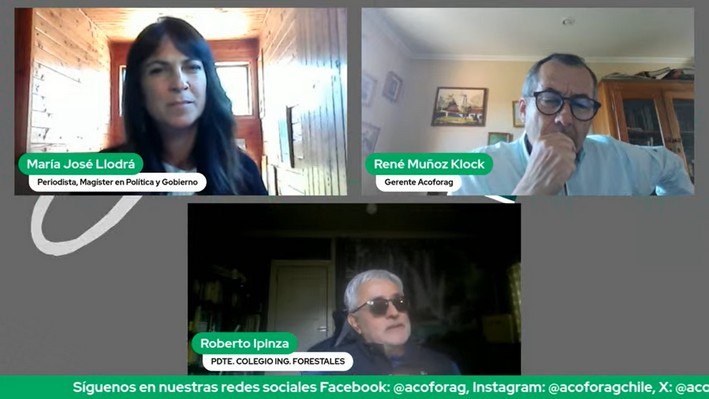Roberto Ipinza, president of the College of Forestry Engineers of the Los Ríos Region and researcher at the Forestry Institute (INFOR), highlighted in "Conversando con la Acoforag" that the lack of adequate economic incentives for forest owners has condemned the law to stagnation.
In episode 44 of the program "Conversando con la Acoforag," Roberto Ipinza, president of the College of Forestry Engineers of the Los Ríos Region and researcher at the Forestry Institute (INFOR), shared a series of reflections and concerns regarding forest management, fire prevention, and public policies in Chile.
Ipinza emphasized that the Native Forest Recovery Law has been ineffective due to its design. According to the expert, it failed to replicate the success of Decree Law 701, which integrated public-private agreements to incentivize reforestation and sustainable management. "Native forests could be thriving if we had followed the model of Decree Law 701," he stated. He added that the lack of adequate economic incentives for forest owners has condemned the law to stagnation.
One of the most concerning points raised was the burden placed on small landowners for fire prevention. Currently, legislation requires them to bear the costs of measures such as building firebreaks. "It is unfair that the owner, often a victim of intentionally set fires, is forced to pay for prevention measures," he noted. According to CORMA data, in 2024, there were 900 reports of forest fires, resulting in only two arrests, reflecting insufficient institutional capacity to address the issue.
Non-timber resources
The impact of fires goes beyond forest loss, warned Ipinza. Non-timber resources like honey, which depends on pollination by bees—a key species for biodiversity—are destroyed. "Every fire destroys hives, livelihoods, and biodiversity, affecting small beekeepers, who make up 87% of the sector," he explained.
Despite progress, such as increased budgets for prevention and the use of technologies like monitoring cameras, Ipinza insisted that shifting the focus toward education and prevention is crucial. "The most controlled fire is the one that never happens," he stressed, highlighting the importance of awareness campaigns to break with a culture that has historically normalized the use of fire.
Finally, the president of the College of Forestry Engineers called for the development of more inclusive, robust laws focused on protecting ecosystems and forest owners. "Allocating more resources is not enough; we need legislation that effectively punishes those responsible for fires and concretely supports those working to conserve the country's forest heritage," he concluded.
This conversation reaffirms the need for a collaborative approach between the state, civil society, and the private sector to address current and future challenges in forest management in Chile.
The full interview is available on Acoforag's YouTube channel:







Comentarios (0)
No hay comentarios aún. ¡Sé el primero en comentar!
Deja un comentario